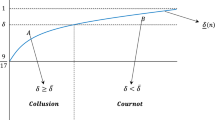Abstract
This paper presents a model of entry and imperfect competition, which is inspired by the product differentiation literature and incorporates facts pertaining to the postal sector. There are two operators: incumbent and potential entrant. The entrant offers only one of the products (commercial mail) with a specific technology and delivers only to part of the addressees (located in low cost areas). Its degree of coverage is viewed as a quality attribute; it affects demand and hence market share. The incumbent faces a USO while the entrant is an unregulated profit maximizing firm. To illustrate the potential applications of our approach, we provide some numerical simulations of entry scenarios.
Similar content being viewed by others
References
Cazals, C., M. De Rycke, J.-P. Florens, and S. Rouzaud. 1997. “Scale Economies and Natural Monopoly in the Postal Delivery: Comparison between Parametric and Non Parametric Specification.” In Managing Change in the Postal and Delivery Industries, edited by M. A. Crew, and P. R. Kleindorfer. Boston: Kluwer Academic Publishers, pp. 65–80.
Cremer, H., M. De Rycke, and A. Grimaud. 1995. “Alternative Scenarios for the Reform of Postal Services: Optimal Pricing and Welfare.” In Commercialization of Postal and Delivery Services, edited by M. A. Crew, and P. R. Kleindorfer, Boston: Kluwer Academic Publishers, pp. 247–267.
Cremer, H., M. De Rycke, and A. Grimaud. 1997. “Costs and Benefits of Universal Service Obligations in the Postal Sector.” In Managing Change in the Postal and Delivery Industries, edited by M. A. Crew and P. R. Kleindorfer. Boston: Kluwer Academic Publishers, pp. 22–41.
Cremer, H., A. Grimaud, and J.-J. Laffont. 2000. “The Cost of Universal Service in the Postal Sector.” In Current Directions in Postal Reform, edited by M. A. Crew, and P. R. Kleindorfer, Boston: Kluwer Academic Publishers, pp. 47–68.
Crew, M., and P. Kleindorfer. 1998. “Efficient Entry, Monopoly and the Universal Service Obligation in the Postal Sector.” Journal of Regulatory Economics 14: 103–126.
Gallet, C., and J. Toledano. 1997. “The Cost of the Universal Service in a Competitive Environment.” In Managing Change in the Postal and Delivery Industries, edited by M. A. Crew and P. R. Kleindorfer. Boston: Kluwer Academic Publishers, pp. 304–320.
Dobbs, I., and P. Richards. 1991. “Assessing the welfare effects of entry into letter delivery.” In Competition and Innovation in Postal Services, editied by M. A. Crew and P. R. Kleindorfer. Boston: Kluwer Academic Publishers, pp. 61–87.
Dobbs, I., and P. Richards. 1992. Entry and component pricing in regulated markets. Mimeo.
Panzar, J., 2001. “A methodology for measuring the cost of universal service obligation”, In Future Directions in Postal Reform, edited by M. A. Crew and P. R. Kleindorfer. Boston: Kluwer Academic Publishers.
Roy, B. 1999. “Technico-Economic Analysis of the Costs of Outside Work in Postal Delivery.” In Emerging Competition in Postal and Delivery Services, edited by M. A. Crew and P. R. Kleindorfer. Boston: Kluwer Academic Publishers, pp. 101–122.
Author information
Authors and Affiliations
Rights and permissions
About this article
Cite this article
Cremer, H., Grimaud, A., Florens, JP. et al. Entry and Competition in the Postal Market: Foundations for the Construction of Entry Scenarios*. Journal of Regulatory Economics 19, 107–121 (2001). https://doi.org/10.1023/A:1011106721301
Issue Date:
DOI: https://doi.org/10.1023/A:1011106721301




